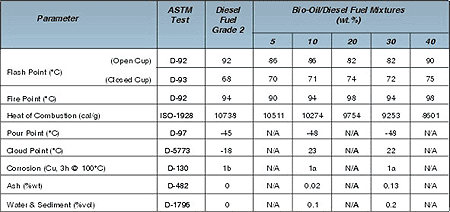
|
|
Bio-oil Diesel Mixture FuelsThe BDM ProcessTM Until the invention of the BDM ProcessTM, the use of bio-oils in conventional heat and power generation systems required major modifications. These bio-oils were usually more viscous than conventional diesel fuel, harder to ignite, strongly acidic, and had low calorific values compared to conventional petroleum- based products. The BDM ProcessTM overcomes these difficulties by producing a stable bio-oil/diesel fuel mixture with properties similar to those of No. 2 fuel oil. CETC-Ottawa invites you to become a licensee of this process.
Mixing Bio-Oils and Diesel Fuel: the BDM ProcessTM It used to be that bio-oils were insoluble in No. 2 diesel oil. Mix the two and they formed two separate phases (see Figure 2). Now an effective process for mixing them is available: the BDM ProcessTM, (see Figure 1). Once mixed by this process, the two oils form a blend that is stable, less corrosive and easy to ignite. Laboratory evaluation of bio-oil/diesel fuel mixtures (see Table 1) according to ASTM and ISO standard test methods attest to these properties. The BDM ProcessTM produces a bio-oil/ diesel fuel mixture with properties similar to those of conventional diesel fuel (see Figure 3). Most boilers, turbines and power generation stations can use this blended fuel without major modifications. Significant capital savings can be realized where a site conversion is planned. Bio-oils are produced from the pyrolysis of various biomass feedstocks such as hardwoods and softwoods, grasses, agricultural wastes, etc.
The benefits of using a bio-oil/diesel fuel mixture include:
Plans for further development include:
The BDM ProcessTM has also been used effectively to blend heavier fuel oils, such as No. 4, with bio-oils. This added benefit will greatly accelerate the penetration of blended bio-oil fuels into existing oil-fired facilities used to generate electricity. Formulated BDM ProcessTM fuels could save a power utility hundreds of thousand dollars every year in fuel savings alone, depending on the fuels blended and their relative proportions. Savings accrued will depend primarily on site specifics, e.g., on avoidance or containment of retrofitting costs.
For further information, please contact:
CANMET Energy Technology Centre-Ottawa Michio Ikura, PhD
|





